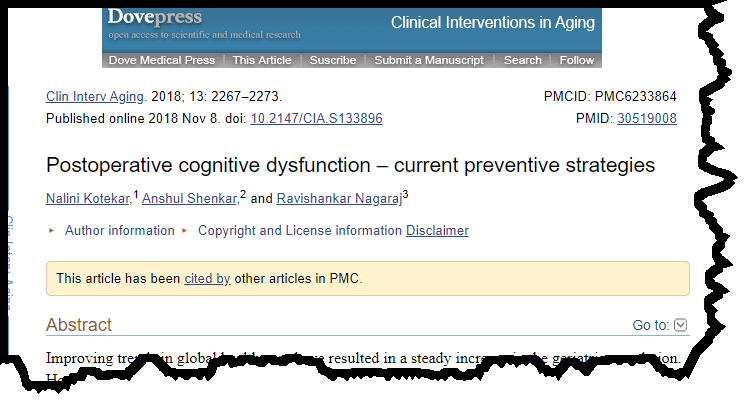
Has this happened to you?
—-Important Message—-
Men: eat one of these to boost your libido BIG time (and naturally raise T)

As soon as you pop this in your mouth, you will instantly start raising your testosterone by up to 73%.
And you’ll feel a surge in manliness and confidence, as your libido spikes and your performance peaks.
This is the fastest, safest way to naturally raise your own testosterone and boost your sex drive, and it works better than Big Pharma treatments.
Plus, there are zero risky side effects. It’s 100% natural.
And it will have you buzzing with confidence and arousal.
Just pop one of these bite-size libido boosters into your mouth and see what I mean
———-
Scary side effect no one’s talking about
My colleague, Heather, tells a story about waking up from anesthesia and suddenly strongly disliking crowded places.
She says it felt like “there was too much going on.”
This was 22 years ago, but Heather still swears that it was the anesthesia that changed how she processed things.
The worst effects of the anesthesia brain fog went away for her pretty quickly, but she swears that it STILL has some effects all these years later.
Now, if you need surgery I’m certainly NOT saying to avoid anesthesia.
You don’t want to go through surgery while conscious. At least I know that I don’t!
But you do need to know that brain fog and weird psychological effects are a VERY common side effect of anesthesia…
And the treatment that you are administered can have a serious effect on whether you experience this or not, or how bad it is.
This is IMPORTANT stuff to know about.

Postoperative Cognitive Dysfunction (POCD) is a common side effect of anesthesia.
This study was done on 75 to 84 year olds, and I do think that being in this age bracket probably makes you more likely to get what they call “postoperative cognitive dysfunction.”
That’s a fancy way of saying you don’t have as much cognitive ability after surgery as you do before surgery.
But I’ve also seen this happen to MUCH younger people and my colleague, Heather, was only 24 years old when it happened to her.
Postoperative cognitive dysfunction (POCD) is a condition that has been poorly defined yet recognized for decades as being an alarming problem in anesthetized elderly patients. Evidence confirms that approximately a quarter of all elderly having major surgery will have an identifiable fall in cognition, and 50% of these patients will suffer a permanent dysfunction.
But in this study, 1 or 4 patients had a cognitive decline and 50% of the patients who had a cognitive decline had a PERMANENT cognitive decline.
Not everyone gets the same anesthesia treatments.
Another thing that a lot of people don’t know is that not everyone gets the same type of anesthesia treatment when they have surgery.
Postoperative cognitive dysfunction (POCD) is a serious complication after surgery, especially in elderly patients. The anesthesia technique is a potentially modifiable risk factor for POCD. This study assessed the effects of dexmedetomidine, propofol or midazolam sedation on POCD in elderly patients who underwent hip or knee replacement under spinal anesthesia.
That’s because you usually aren’t given a choice and you may not even know there IS a choice.
But it’s important that you consider the treatment you’re being given.
Because of the treatments available, propofol has much less cognitive dysfunction effect.
Among dexmedetomidine, propofol and midazolam sedation in elderly patients, propofol sedation shows a significant advantage in term of short-term POCD incidence.
Preventing Postoperative Brain Fog.
First, if you are going to have surgery, make sure you are choosing the right treatment for anesthesia.
Since propofol shows fewer cognitive effects you may want to ask your doctor to request it.
The other thing that you can do is to have family and friends there to support you both before and after surgery.
Being socially active is good for our health and our cognitive function.
There is substantial evidence that moderate physical activity and social involvement have a positive role in improving cognitive functions in healthy people as well as in the cognitively impaired.
Having a friend or family member help you as you recover can significantly reduce your risk of POCD.
Patients should be nursed in a quiet postoperative environment, preferably in the presence of family members as this has proven benefits against POCD.
Here’s the bottom line… If you have to get surgery ask about what treatments they are using for anesthesia and try to have lots of social support.
It could significantly help your cognitive function both short- and long-term after surgery.
—-Important Message—-
This pointing finger technique will score you huge points in bed

Just one week after using this pointing finger technique, I had my wife quivering from two powerful, rapid orgasms… back-to-back.
I hadn’t been able to do that to her in years!
Now with just my pointing finger, I’m able to pleasure her the way she craves and get her moaning my name again and again…
And it’s so sexy seeing her enjoy herself this way, and my confidence is soaring now that I know I can make her feel this good.
Plus, she wants to do it more often than ever! She’s addicted to this pleasure.
And it’s all thanks to this secret pointing finger technique.
Try it tonight and prepare to be wow’d
———-

